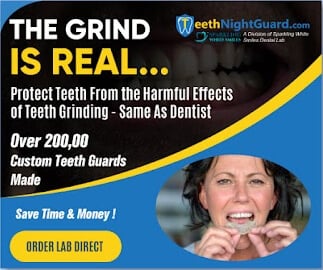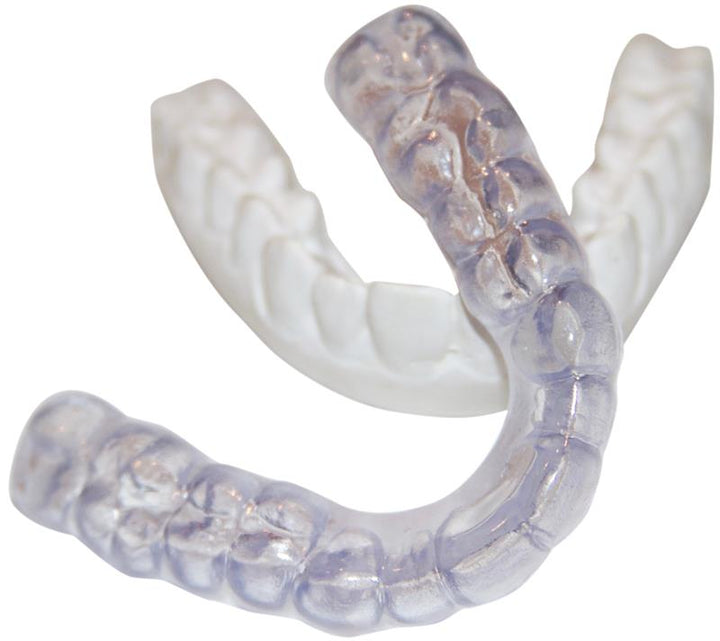Have you wondered whether you might inherit a teeth-grinding habit from your parent or pass one along to your child? There are many medical conditions, habits, and mental health issues that are hereditary. And, as it turns out, teeth grinding might fall into that category (at least partially).
Bruxism is very widespread.
Bruxism, the fancy term for grinding or clenching your teeth, is a problem that affects between 50% and 90% of adults, while reports in children vary widely with anywhere from 7% to 88% of children being affected. One reason for this variation in incidence prevalence has to do with intensity. Oftentimes, minor bruxism, the kind that is not aggressive or frequent, goes unnoticed.
Additionally, bruxism can be broken into two categories: diurnal and nocturnal. Diurnal bruxism happens in the daytime, during waking hours, and generally involves more clenching than grinding, meaning it does not produce much noise. It might fall into the category of repetitive behaviors and tics, like nail biting.
Meanwhile, nocturnal bruxism can be more intense and more oriented toward grinding because the sleeper is unconscious and therefore unaware of the noise.
Teeth grinding may be partially genetic.
Because of how widespread teeth grinding is, it is hard to say how much genetics plays a role in bruxism, but up to 50% of people with bruxism have a close family member with the same issue. Some studies have found that genes are a possible contributor.
The exact triggers of bruxism, however, are about more than just genes. Interrupted sleep patterns, stress, alcohol, and caffeine consumption, depression, snoring, and sleep apnea are all associated with an increased chance of teeth grinding. So, how genes predispose a person to some of those bruxism triggers might be the hereditary link behind family members sharing the same habit.
If you are concerned about whether you or your family member has developed bruxism, look for signs of the issue and, if you sleep with a partner, ask them for feedback on anything they have noticed during the night. Physical symptoms of teeth grinding can include increased tooth sensitivity, frequent canker sores (from biting the inside of the mouth), wear and tear on the teeth, recurring headaches, jaw tenderness, and neck pain.
If you believe you are suffering from concurrent sleep issues, such as insomnia or sleep apnea, you may benefit from a sleep study that can more accurately assess everything that is going on within your body during sleep.
Teeth grinding is a problem you should address.
Grinding your teeth on a regular basis will wear down your enamel over time, exposing the dentin below and making your teeth more sensitive and prone to infection. It can also cause your gums to become chronically irritated or inflamed, which increases your risk of getting periodontal disease, experiencing retreating gums, and losing teeth. You might even crack or chip a tooth if you grind or clench aggressively.
Given these risks and long-term effects, it is important to discuss a treatment plan with your dentist or healthcare provider. Sometimes, treatment plans will also need to address a concurrent or contributing issue, such as sleep apnea or a TMJ disorder (a problem with the jaw joint).

Bruxism can be treated but may not fully go away.
There are many ways to reduce the severity and frequency of tooth grinding as well as prevent the issue from causing damage to the teeth and gums.
Night guards, also known as mouth guards, cushion and protect the teeth and gums by providing a plastic buffer around the teeth. This is important for maintaining your oral health against the effects of grinding. Sometimes, night guards also work to reduce the frequency of grinding, especially if they are made to address a TMJ disorder or other specific alignment or bite issue.
Reducing your stress can decrease teeth grinding as well. So can lowering your intake of caffeine or alcohol. Therefore, it is important to take steps to alleviate mental and physical tension while also supporting your physical health. Try including a wind-down routine at the end of your day and maintaining a healthy diet.
For those who carry a lot of tension in the jaw muscles, Botox injections for bruxism can help to lower the incidence and severity of grinding.
Additionally, treating conditions like depression or any physical conditions, like misaligned teeth or a misaligned bite can decrease the incidence of teeth grinding.
So, do not assume that inheriting a teeth-grinding habit from a parent or passing it along to a child leaves you with no options. There are always methods to improve your sleep, lessen the grinding, and protect your teeth.
One of the best ways to get started is by choosing a custom night guard that will fit you comfortably. Visit TeethNightGuard to find an affordable option you can order right from home.
JOIN OUR NEWSLETTER! RECEIVE PROMOTIONS & COUPONS FOR CUSTOM DENTAL NIGHT GUARDS
INTERESTED IN BECOMING AN AFFILIATE OF TeethNightGuard.com?
Earn a 15% commission for simply sharing with your friends and family through email or social media such as Facebook, Reddit, or Twitter. Sign up and learn more here: https://www.teethnightguard.com/pages/register-affiliate-account
EXTRA DURABLE 3MM CUSTOM NIGHT GUARD - MAXIMUM DURABILITY AND COMFORT - MOST RECOMMENDED

$119.99
Item Number SWSPRO Manufacturer Sparkling White Smiles Dental Lab Rating Product Description Love this product? Share the product page link with Friends and Family. Simply copy the product page web address or this link: Custom Teeth Night Guard and post!… Read More